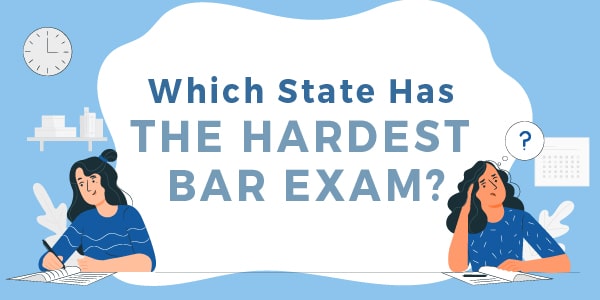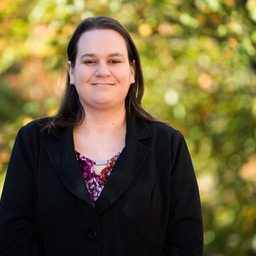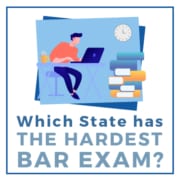
For example, many experts believe that California has one of the hardest bar exams to pass in order to work as a licensed attorney in the state.
What does this mean for you as a soon-to-be lawyer in the Golden State? It might be a good idea to take the bar in a neighboring state. Then, you can take an abbreviated form of the California bar exam once you have some experience under your belt.
Keep reading to understand how and why some state bar exams are harder than others. We’ll cover some particular challenges of this test, state alternatives to the Uniform Bar Exam, passage rates, and how you can prepare for your test date.
“It might be a good idea to take the bar in a neighboring state. Then, you can take an abbreviated form of the California bar exam once you have some experience under your belt.”
What Makes California One of The Hardest Bar Exams?

- Five one-hour essay questions
- One 90-minute performance test
- Six hours for the Multistate Bar Examination (MBE) that includes 200 multiple-choice questions
Despite making these changes, this difficult bar exam has the lowest pass rate of any test held in the United States, according to List Surge. Furthermore, ABA Journal noted that the California bar passage rate in 2018 was the lowest in 67 years— only 40.7% for July test takers. Sounds pretty bleak, huh? Well there’s one important reason for CA’s abysmal bar exam pass rate: In California, you can sit for the bar exam even if you didn’t graduate from an ABA accredited law school. For that matter, you can sit for the exam without graduating from any law school. It’s part of a handful of states that allow bar exam applicants to obtain legal education by law office study in which they study law at a law firm for a certain amount of time. Naturally, receiving a legal education from an unaccredited school coincides with a lower passage rate. So if you actually go through the effort to graduate from a reputable law school, your chances of passing the CA bar are higher than the average!
“Naturally, receiving a legal education from an unaccredited school coincides with a lower passage rate. So if you actually go through the effort to graduate from a reputable law school, your chances of passing the CA bar are higher than the average!”
What’s on the California Bar Exam?
The California Bar Exam consists of the following major areas:
- Performance test: This portion of the test evaluates the taker’s ability to handle legal challenges encountered when working with a client.
- Essay questions: Test takers must also answer five essay questions; each one takes one hour. These questions are meant to demonstrate your understanding of the law and how to properly apply it.
- Multistate Bar Examination: This portion of the test is a standardized test consisting of 200 multiple-choice questions. It’s based on civil procedure, constitutional law, contracts, criminal law, criminal procedure, evidence, real property, and torts.
According to The State Bar of California, test takers may be asked questions in any of the following areas:
- Business Associations: Applicants may be asked questions that concern a variety of business types. These include sole proprietorships, general partnerships, limited partnerships, limited liability partnerships, corporations, joint ventures, limited liability companies, and principles of agency.
- Civil Procedure: Test takers may be asked questions regarding the Federal Rules of Civil Procedure and the California Code of Civil Procedure, including the differences between the two.
- Community Property
- Constitutional Law
- Contracts
- Criminal Law
- Criminal Procedure
- Evidence: Applicants may be asked about the Federal Rules of Evidence and the California Evidence Code, including comparing and contrasting the two.
- Professional Responsibility: Applicants will be asked questions about the California Rules of Professional Conduct, California Business and Professions Code, the ABA Model Rules of Professional Conduct, and the ABA Model Code of Professional Responsibility. Test takers must also take the Multistate Professional Responsibility Examination to become licensed to practice law in California.
- Real Property
- Remedies
- Torts
- Trusts
- Uniform Commercial Code: Essay questions may ask for information based on Article 1, Article 2, or about fixtures in Article 9
Wills and Succession: Test takers should be familiar with the California Probate Code and understand California laws concerning: the effect of death of married persons on community and quasi-community property, contracts regarding rights at death, simultaneous deaths, distribution among heirs or beneficiaries, wills, revocation and revival of wills, intestate succession, construction and interpretation of wills, trusts, and other instruments, omitted spouses and children.
California Bar Exam for Existing Lawyers
Are you still worried about CA’s low bar exam passing rate? Here’s another tip that can help you out: California offers a shorter and less difficult bar exam for test takers who are already licensed to practice law in another state or jurisdiction. Attorney applicants may be able to take the one-day Attorneys’ Examination if they meet the following guidelines:
- Have an active law license
- Be certified in good standing for at least four years
- Pass a moral examination
- Be compliant with any family or support order
Bar Exam Pass Rates by State: Highest to Lowest
One way that people use to identify more difficult bar exams is to look at the passage rate. The theory is that if more people pass the test, then it must be easier. According to Law.com, these are the states with the highest pass rates for first-time bar takers:
- Oklahoma: 86.9%
- Iowa: 86.57%
- Missouri: 86.3%
- New Mexico: 85.71%
- New York: 83.92%
- Montana: 82.61%
- Utah: 82.61%
- Oregon: 82.55%
- Nebraska: 81.67%
- Kansas: 81.51%
States with low pass rates for first time test takers in 2017, in ascending order, include:
- Puerto Rico: 40.25%
- Mississippi: 63.95%
- Arizona: 63.99%
- North Carolina: 65.22%
- California: 66.19%
- Maryland: 66.7%
- Florida: 67.9%
- South Dakota: 68.18%
- Kentucky: 69.02%
- Vermont: 69.33%
You might think that you’ll have an easier time passing the exam in states like Oklahoma and Iowa because of this data. But keep this in mind before you book that plane ticket:
Pass rate is certainly one factor to consider when determining the relative difficulty of a state bar exam. However, this shouldn’t be the only factor you consider!
For example, New York had a relatively high passage rate of 63% in July 2018 and 68% in July 2017. Despite that, it’s considered one of the most difficult bar exams.
Now let’s look at our previous example of a notoriously difficult state bar exam. California has approximately 16,000 test takers each year, according to The State Bar of California. Therefore, there are many more people taking this test than in many other states— which explains their higher passage rates.
“Pass rate is certainly one factor to consider when determining the relative difficulty of a state bar exam. However, this shouldn’t be the only factor you consider!”
State Bar Exam Difficulty – The Best Way to Judge
The degree of a bar exam’s difficulty varies by state and this critical factor cannot be discerned solely by comparing bar passage rates. Many factors can affect the objective difficulty of a test, as well as how difficult it may be for you. Some of these determining factors include the quality of your education, the components of the test, the subject matter tested, and your personal study habits.
If you have a choice of which state to take your bar exam, you may be interested in Professor Robert Anderson’s analysis of the most difficult bar exams. He’s a professor at Pepperdine School of Law, and he used rigorous statistical analysis to determine the most difficult bar exams. Some of the factors he considered were bar passage rate, median undergraduate GPA and LSAT scores of students, an indicator variable for each state, the weighted average by number of test takers, and a regression analysis.
The top ten in order of most difficulty included:
- California
- Arkansas
- Washington
- Louisiana
- Nevada
- Virginia
- Oregon
- West Virginia
- Vermont
- Maryland
Easiest Bar Exams By State:
What about the easiest Bar exams? Based on Professor Anderson’s research, the easiest bar exams are:
- South Dakota
- Wisconsin
- Nebraska
- Iowa
- Montana
- Wyoming
- Michigan
- Oklahoma
- New Mexico
- Missouri
Notable People Who Have Failed the California Bar Exam
Are you worried about failing the California Bar Exam? Don’t be— you’re in good company.
These influential figures failed the CA bar at first, but went on to pass it on subsequent attempts and achieved great things in their careers:
- Former California Governor, California Attorney General, and mayor of Oakland Jerry Brown failed the California Bar Exam on his first try1
- Former dean of Stanford Law School and constitutional scholar Kathleen Sullivan also failed California’s test.2
- Paulina Bandy became notorious for failing the California Bar Exam 13 times before eventually passing. She later went on to create a website geared at helping others pass the bar.3
- Former California governor Pete Wilson failed the test three times before eventually passing it on his fourth attempt.4
- Maxcy Dean Filer finally passed the California Bar Exam in 1991 after failing 47 times before that!5
Honorable Mentions for Hardest Bar Exams
While California’s bar exam may be largely perceived as the hardest one in the nation, some other states that may pose similar difficulty and the reasons for this include:
- Arkansas: Arkansas also has a grueling two-day test. It requires you to know several state and local laws, in addition to federal ones. While it consists of the MBE, MEE, and MPT that many jurisdictions use, the scores are calculated differently; hence, you require a slightly higher score to pass the Arkansas bar exam.
- Louisiana: Because Louisiana law schools teach both the common law and civil law legal systems, it is often necessary for students sitting for the bar to have been educated in one of the state schools to understand this unique legal system. Additionally, the test doesn’t use the standard testing sections — MBE, MEE, or MPT — so some study programs may not be tailored to the unique needs of Louisiana test takers, making it more difficult to prepare for this test.
- Nevada: Nevada’s bar exam requires test takers to understand a variety of unique laws. The essay portion of the test is considered especially challenging, due to long model answers. Test takers are expected to identify and discuss many issues. Additionally, test takers must have a higher score in Nevada to pass the bar exam.
- Delaware: Delaware also requires test takers to obtain a higher score than most other states in order to pass. Additionally, the test takes three days and is only offered once a year.
- Virginia: Test takers in Virginia can be tested on up to 24 different areas of the law, requiring applicants to study much more content than those in other states.
How to Study for the Bar Exam
Whether you are taking your bar exam in California or in South Dakota, one thing you should count on is studying. You have many different options for studying and should consider the method that best fits your needs, time to study, and study habits. Your options might include:
- A professional bar preparation course: Many of the big test preparation companies offer in-person or on-demand professional courses taught by law professors or others who have passed the bar exam. You may have access to diagnostic tools, AI, flashcards, audio lessons, video lessons, and other tools with these courses.
- Study books: If self-study is more your style, you may be able to use commercially-prepared outlines, released questions, and study books to help prepare for the bar exam.
- Private tutoring: If you need more individualized assistance or want to focus on a limited area of the law, private tutoring may help.
Conclusion
The bar exam is a difficult test regardless of where you take it. If you are interested in taking the test in different jurisdictions, you might want to research bar passage rates and the content on the test to determine which one you are most prepared for. Also, be sure to choose study materials that are specific to your state.
Good luck!
Sources
- https://crushendo.com/famous-people-failed-the-bar/
- https://news.pieperbar.com/famous-people-who-have-failed-the-bar-exam
- https://abovethelaw.com/2007/07/the-bar-exam-if-at-first-you-dont-succeed/
- https://www.jdadvising.com/famous-people-who-failed-the-bar-exam/
- https://old.post-gazette.com/pg/05340/618227.stm

Valerie Keene is an experienced lawyer and legal writer. Valerie’s litigation successes have included wins for cases involving contract disputes, real property disputes, and consumer issues. She has also assisted countless families with estate planning, guardianship issues, divorce and other family law matters. She provides clients with solid legal advice and representation.




